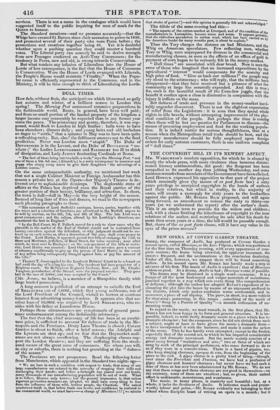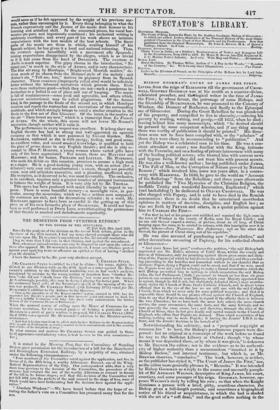NEW OPERA AT COVENT GARDEN THEATRE.
ROOKE, the composer of Amine, has produced at Covent Garden a second opera, called Henrique,or the Love Pilgrim; which was performed for the first time on Thursday evening, with every appearance of com- plete success ; the house being crowded, the applause incessant, the encores frequent, and the acclamations at the conclusion deafening. Under all this, however, we suspect there will be found something hollow. In his second opera Mr. Room.: has hardly made a step in advance of his first. The music of Audio is excellent ; that of Henrique seldom so good. As a drama, Amille is bad ; Henrique worse, if possible. The drama may be dismissed in a single word—nonsense. It is a farago of all the most hackneyed and vulgar materials of melodrama, jumbled together in a way which sets every thing like comprehension at defiance ; although the author has adopted RATES'S expedient of in- sinuating the plot into the boxes by means of an argument prefixed to the libretto, which only makes confusion worse confounded, and is, moreover, a piece of sad slipslop. The pieco, in short, is a mere vehicle for sing-song ; possessing, in this respec-, something of the merit of Pores "Song by a Person of Quality "—a smooth collocation of un- meaning words.
ln regard to the music, we must remark, in the first place, that Mr. RooKE has not been happy in its form and general structure. It is im- possible, indeed, to write really dramatic music to a piece which has no dramatic character ; but the composer, since he did not shrink from such a subject, ought at least to have given his music a dramatic form— to have incorporated it with the business, and made it assist the action of the scene. This he has hardly even attempted ; except in the finales, especially that of the second act, to which he has imparted considerable energy and dramatic movement. But the music mainly consists of a great many formal "recitatives and airs ;" two or three of which are sung by each of the principal performers, who conic forward to do so as if they were in a concert-room. There is a band of gipsies, too, who keep singing choruses, apropos de rien, from the beginning of the piece to the end. A gipsy chorus is a pretty kind of thing,—though, ever since the Freisehutz and Preciosa, we have had a profusion of gipsy choruses and bunters' choruses ; but never have we had such a dose of them as has now been administered by Mr. ROOKE. We do not say that these songs and these choruses are not good in themselves—on the contrary, some of them are excellent ; but, so given, their united effect is undramatic, monotonous, and wearisome.
The music, in many places, is masterly and beautiful ; but, as a whole, it lacks the freshness of Amilie. It indicates much and praise- worthy labour and pains,—Mr. ROOKE evidently not belonging to that school whose disciples boast of writing an opera in a month; but it
would seem as if he felt oppressed by the weight of his previous sue- seas , rather than encouraged by it. Every thing belonging to what the French expressively call the facture of his music does honour to his learning and artistica skill. In the concerted pieces, his vocal har- monies are pure and ingeniously combined ; his orchestral writing is uniformly excellent ; and every part of his work shows an intimate acquaintance with the best models of the best schools. The finest parts of his music are those in which, availing himself of his Spanish subject, he has given it a local and national colouring. Thus, the overture opens beautifully with a movement alla Spagnola ; raising expectations disappointed by the allegro, which is as trivial as if it had come from the hand of Doxizerri. The overture to Milk is much superior. The gipsy chorus in the introduction, "No
signal yet," is much in the style of AURER, and is very characteristic.
The first air sung by Henrique, "Bright-eyed Moorish maiden," de- rives much of its charm from the Moresco style of the melody : and Alzine's air, "Tell me, lute," derives its piquancy from its Spanish character. These romances (improperly called airs) would be infinitely better without the laboured recitatives which precede them. Even were these recitatives good—which they are not—such a ponderous in- troduction to a ballad is out of place and out of keeping. The music is fall of reminiscences—some good and agreeable, and others which, however unintentional, may be called plagiarisms. Of the former kind, is the passage in the finale of the second act, in which Henrique receives and repels the reproaches and execrations of the surrounding
multitude, and which strongly brings to mind a similar situation in the finale to the first act of Don Giovanni. Of the latter, is the motivo of the air "Thou lovest me now," which is a transcript from La Kande of Autism On the whole, this opera will not lower Mr. ROOKE'S reputation, though neither will it raise it.
The performance in every respect was excellent. It is long since any English theatre has had so strong and well-appointed an operatic company as that which is now possessed by Covent Garden. Miss
RAINFORTII, endowed as she is with energy, feeling, and good sense, an excellent voice, and sound musical knowledge, is qualified to hold the place of prima donna in any English theatre ; and she is ably se- conded by Miss P. HonTost, a young woman whose varied gifts have only of late been appreciated. For tenors, there are MasvEas and HARRISON; and for basses, PHILLIPS and LEFFLER. Mr. HARRISON,
who made his dafit on this occasion, promises to assume a high rank as a singer. He is a good-looking young man, with an action (for a &buten° very easy and unembarrassed; a sweet, though not powerful
voice, neat and articulate execution, and a pleasing, unaffected style. His reception, a3 it deserved to be, was most favourable. The orchestra, to be excellent, requires only a greater number of stringed instruments to balance the weight of brass. It is very ably led by Mr. Tnostas.
This opera has been produced with much liberality in regard to ex- pense. There is some beautiful scenery—a moonlight view, in par- ticular, among the mountains, which we have seldom seen surpassed ;
the costumes are rich, and the decorations splendid : in a word, Mr. MACREADY appears to have been as careful in the getting-up of this piece as of his own favourite plays of SHAKSPERE. It could not have been so well performed at Drury Lane, notwithstanding the pretensions of that theatre to musical and melodramatic superiority.



























 Previous page
Previous page